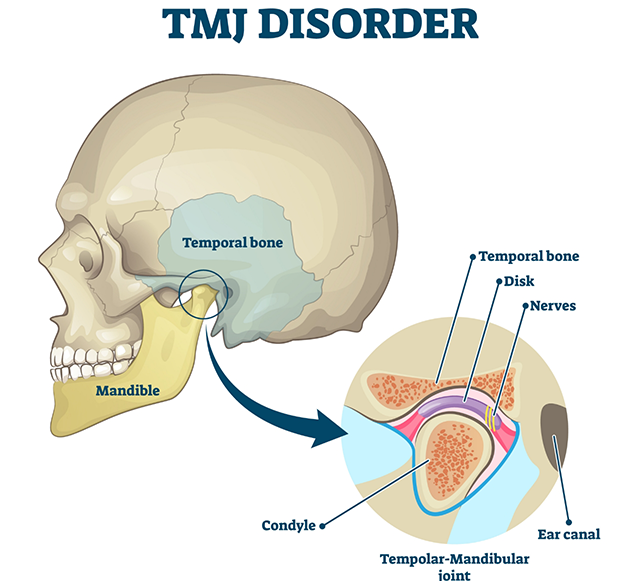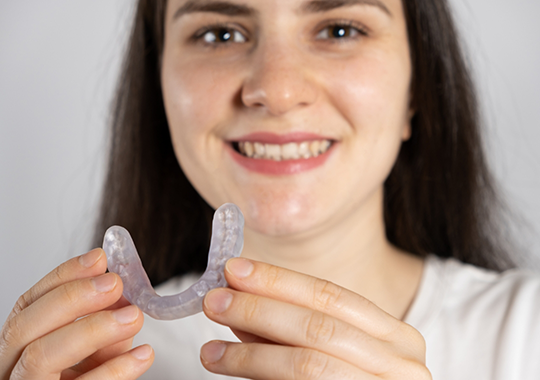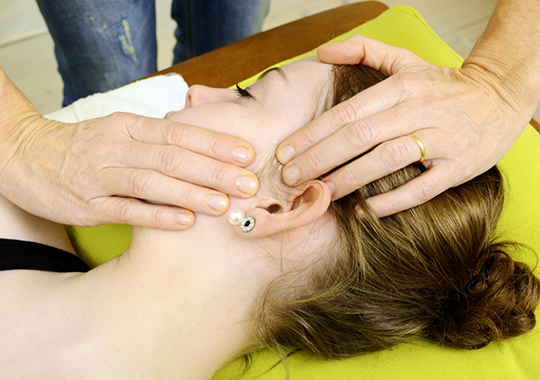TMJ Treatment Owasso
Helping You Find Relief from Jaw Pain
Have you been experiencing pain in your jaw recently and aren’t sure why? There are a number of possible explanations, but in many cases, the issue may be that you’re suffering from what is known as TMJ disorder. Fortunately, Dr. Lim has been specially trained to help his patients find relief from this condition. If you’re ready to put your jaw pain behind you, don’t waste any more time; pick up the phone and call our dental office to start exploring your options for TMJ treatment in Owasso.
Hear Our Real-Life Patients’ Stories
Why Choose Life Smiles of Owasso for TMJ Treatment?
- Advanced Training in Neuromuscular Dentistry
-
Personalized
Occlusal Splints - State-of-the-Art TENS Machine Treatment
What is TMJ Disorder?

TMJ is an acronym that stands for “temporomandibular joint.” These are the joints that connect your jaw to your skull, and they’re responsible for a wide range of movements. You rely on smooth-functioning TMJs for normal daily actions like chewing, speaking, yawning, and laughing. So, when you begin suffering from TMJ pain in Owasso, it can severely impact your life.
If you are experiencing pain or some kind of malfunction with your TMJ, then you may have a condition called TMD: temporomandibular joint disorder. TMD may present with many uncomfortable symptoms that far surpass chronic jaw pain.
Common Symptoms of TMJ Disorder

You don’t want to ignore your TMJ disorder for too long, so it’s important to be able to recognize the symptoms associated with it. Below are some common warning signs that can point to TMJ problems; we encourage you to reach out to our team immediately if any of these symptoms sound familiar:
- Lockjaw – when your jaw locks in an open position
- Migraines, headaches, and dull thumping head pain
- Pain in the neck and shoulders
- Earaches and ringing in the ears
- Clicking and popping of the jaw joints
- Difficulty eating or speaking
- Fatigue while chewing
- Dizziness or vertigo
- Teeth grinding, also known as bruxism
Why is It so Important to Treat TMJ Disorder?

Many people suffer from TMJ pain for years before discovering something can be done about it. So naturally, one of the reasons to seek medical attention from your Owasso dentist is that you don’t have to live in pain. You can regain your quality of life with the right treatment.
But there are other reasons why you need to seek treatment when you have TMJ disorder. The pain you feel is telling you that something isn’t right. Sometimes, your pain may go away when your situation changes. For example, in a temporary situation of high stress, your teeth grinding may go away after the situation passes. You may also experience jaw pain from body aches due to an illness, but that, too, will often go away with time.
However, when your check engine light stays on consistently, you know something is wrong, and without maintenance, the problem will worsen. The same is true for TMJ disorder. If your pain persists for 10 days without a reasonable explanation, seek TMJ treatment in Owasso. Without treatment, you could experience the following:
- Permanent nerve pain
- Permanent hearing loss
- Chronic pain disorder
- Vertigo
- Frequent headaches and migraines
-
Depression and anxiety
Dr. Lim’s Unique TMJ Treatment Approach

There is no recognized dental specialty for TMJ treatment, so no dentist can legally be labeled a “TMJ specialist” or “TMJ dentist.” However, effectively treating TMJ disorder requires advanced training beyond what is offered in the basic dental school curriculum. Dr. Lim is one of only 500 fellows of the Las Vegas Institute of Advanced Dental Studies, where he received advanced training in neuromuscular dentistry.
Since 2003, Dr. Lim has treated many patients from all corners of the country. They have chosen to visit Dr. Lim for help with managing migraine pain, neck pain, and TMJ pain after hearing about how he has successfully helped others. Even other medical professionals have referred their own patients to Dr. Lim because of his reputation for successfully treating TMJ pain. Dr. Lim’s extensive experience and passion for TMJ treatment and providing much-needed relief for his patients make him an outstanding choice for this type of care. He is ready to alleviate your jaw pain and other TMJ symptoms with his effective holistic approach.
Our TMJ Treatment Options

Our TMJ dentist in Owasso will begin by carefully listening to you as you describe your TMJ issue. We will then conduct non-invasive and pain-free tests on your TMJ with a CT scanner and an EMG (electromyography) device. After gently examining your jaw to explore its range of motion, we will determine any other factors in your bite that may be contributing to your discomfort.
At Life Smiles of Owasso, we aim to treat TMJ disorder without medication, as Dr. Lim is a whole-health dentist. We will first recommend some medication-free techniques to help you soothe and manage your TMJ pain, and then we will discuss with you some potential solutions to address the underlying cause of your pain. Treatment could be as simple as wearing a special appliance or could involve extensive work, such as a full mouth reconstruction to balance out your bite. Learn more about these options below.
NEUROMUSCULAR ORTHOTICS

A neuromuscular orthotic can be used to help stabilize the jaw, keeping it in a position where the jaw joints and the muscles around them aren’t exposed to as much strain. They are typically worn for about 90 days to allow the muscles, jaw joint, nerves, head, and neck to heal. Once this process is complete, we will proceed to more in-depth care such as orthodontics, full mouth reconstruction, or a long-term orthotic.
TENS Machine Treatment

TENS is short for “transcutaneous electrical nerve stimulation.” This type of treatment uses low-voltage electrical currents to help address your pain. The currents can stop pain signals from being sent to the brain. Furthermore, a TENS machine treatment can encourage the release of endorphins, which are natural painkillers.
Equilibration/ Occlusal Adjustments

If your TMJ disorder is due to problems with the alignment of your bite, equilibration may be suggested. In some cases, we will only need to make a few minor adjustments to your teeth; in other situations, a full mouth reconstruction might be required. It all depends on the specifics of your disorder, which is why a detailed examination of your mouth and jaw is so important.
TMJ FAQs
Is TENS Treatment for TMJ Safe?
TENS stands for “transcutaneous electrical nerve stimulation.” It consists of temporarily placing electrode pads on your jaw joints, neck, or other areas that are in pain. Low-voltage electric currents then encourage your jaw muscles to relax, which reduces the stress of the TMJs while also causing your brain to produce endorphins that relieve pain.
For the majority of people, TENS treatment is perfectly safe to use for TMD. It is non-invasive and doesn’t involve any needles or medication. There are a few contraindications to using a TENS machine. You should let your dentist know if you are pregnant, trying to become pregnant, have epilepsy, have a pacemaker, or have a heart condition. This way, an informed decision can be made for your safety.
How Long Does It Take for a TMJ Splint to Work?
Occlusal splints for TMD are worn 24/7. You may notice that your symptoms begin to subside quickly, but they won’t disappear all at once. It takes time for your TMJs and the areas surrounding them to adjust to their new positions. Phase 1 typically lasts 90 days, but it can take anywhere from three to six months for an occlusal splint to fully relieve TMD discomfort.
How Long Does Occlusal Equilibration Take for TMJ?
Equilibration/occlusal adjustments can vary in how quickly they bring relief. This depends on the specific changes that are being made. However, once the bite is more aligned, most patients experience some level of relief soon after. Generally, it takes between one and three appointments for the necessary adjustments to be made to evenly distribute your bite force.
Can TMJ Be Treated Without Surgery?
Yes! The National Institutes of Health recommends using the most conservative methods possible for treating TMJ dysfunction. When it comes to treating TMD, less is often more. Since surgery makes permanent changes to the jaw and nearby anatomy, it is typically only suggested as a last resort. In most cases, TMD can be addressed with less invasive methods. This includes stress relief, occlusal splints, equilibration/occlusal adjustments, and TENS machines.
Can TMJ Be Cured Permanently?
It depends. Some treatments, such as TENS, are meant to provide temporary TMJ relief. This doesn’t mean that they can’t permanently solve your TMJ disorder if your symptoms are mild. But since they don’t physically adjust your oral structure to relieve the pressure exerted on your TMJ, they can’t technically “cure” TMJ disorders, and results can be limited for some patients.
Treatments that do target the physical structure of your jaw and TMJ, like neuromuscular orthotics and occlusal adjustments/equilibration, tend to be more permanent. Rest assured, the severity of your symptoms and the nature of your TMJ discomfort will be factors we take into consideration when recommending treatment!
Can TMJ Be Fixed with clear aligners?
If your TMJ disorder is caused by tooth or jaw misalignment, then orthodontics could very well fix the issue.
When your teeth don’t line up properly, it changes how chewing and biting pressure is distributed across your jawbone. Specific areas essentially start to experience more physical stress than others. As a result, the nearby bone and muscles can become overstrained, creating your TMJ discomfort. SureSmile clear aligners can straighten out both your teeth and your jaw so that pressure is more evenly distributed, thus solving the root problem of your disorder.
Does Occlusal Adjustment for TMJ Hurt?
Rest assured, we’ll take every step possible to help ensure your occlusal adjustment is quite comfortable!
In some cases, dental misalignment can be corrected by simply adding mass to the teeth or by shaving them down ever so slightly. If an occlusal adjustment involves adding mass, we’ll sculpt a soft, moldable resin over your pearly whites, which is rarely painful and almost never requires an anesthetic. When altering teeth by shaving them down, we’ll be sure to numb your mouth and minimize your discomfort.
Is TMJ Treatment Covered by Insurance?
In Oklahoma, state law requires medical insurance companies to provide benefits for medically necessary TMJ treatments. That said, coverage can vary from plan to plan, and it’s possible your policy doesn’t cover specific types of TMJ treatment. Some dental insurance policies also have TMJ benefits, so if you have dental insurance, it’s worth checking the details of your plan to see if it would save you more money.
In any case, our team is happy to help you navigate your insurance and maximize your coverage! Don’t hesitate to get in touch if you have any questions or concerns about affording TMJ treatment in Owasso.
